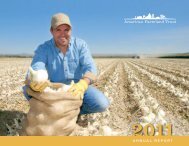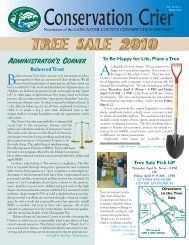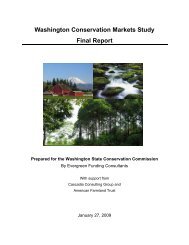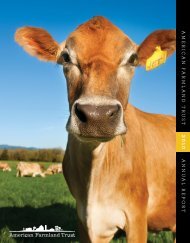Farms for the Future: Massachusetts - American Farmland Trust
Farms for the Future: Massachusetts - American Farmland Trust
Farms for the Future: Massachusetts - American Farmland Trust
Create successful ePaper yourself
Turn your PDF publications into a flip-book with our unique Google optimized e-Paper software.
<strong>Massachusetts</strong>’ Investments in <strong>Farmland</strong> ConservationExpanding <strong>the</strong> <strong>Farmland</strong> Conservation ToolboxOver <strong>the</strong> past 30 years, <strong>Massachusetts</strong> has created and substantially invested in programs tohelp secure <strong>the</strong> Commonwealth’s farmland base and improve <strong>the</strong> economic and environmentalsustainability of its farms. Some of <strong>the</strong>se programs, like <strong>the</strong> FVEP, and initiatives, like <strong>the</strong> APRprogram’s “option at agricultural value,” were groundbreaking policy innovations that havebeen emulated in o<strong>the</strong>r states. Ano<strong>the</strong>r program not detailed in this report but valuable as a tool<strong>for</strong> financing farmland protection projects—<strong>the</strong> Community Preservation Act—has beenano<strong>the</strong>r national model.As <strong>the</strong> agricultural industry’s land uses and needs evolve and environmental conditions change,<strong>the</strong>re is both a need to evaluate and examine <strong>the</strong> effectiveness of <strong>the</strong> current farmland conservationtoolbox and a need to assess whe<strong>the</strong>r new and complementary tools may be needed. Somepotential tools that may be worthy of additional exploration are identified below. AFT hopesthat this initial, partial list may provide a starting point <strong>for</strong> dialogue and innovative thinkingamong farmers and conservationists, community leaders and policy makers, about new policyinitiatives that can continue <strong>the</strong> Commonwealth’s important commitment to ensuring farms <strong>for</strong><strong>the</strong> future.New financing <strong>for</strong> farmland protection: Installment Purchase AgreementsInstallment Purchase Agreements, or “IPAs,” have been used <strong>for</strong> years by o<strong>the</strong>r state andcounty farmland protection programs as a means of providing landowners who sell agriculturalconservation easements with a phased payment option that defers capital gains andprovides annual interest payments while stretching public funding <strong>for</strong> farmland protectionby providing less cash to <strong>the</strong> seller up front. Offering a long-term payment contract optionthat can be sold or securitized at any time to realize <strong>the</strong> outstanding principal may attractnew interest from land-owners in <strong>the</strong> APR program.Coordinating smart growth, farmland protection and agricultural economic development<strong>Massachusetts</strong>’ Agricultural Incentive Area statute (M.G.L. Chapter 40L) has been largelyignored because of its lack of incentives to municipalities or farmers. A revised Chapter 40Lcould provide new incentives to communities to identify agricultural or farm and <strong>for</strong>est districtsand encourage land protection within those districts, while targeting new or currentstate benefits to <strong>the</strong> landowners within those districts.Linking farm pensions and farmland protectionFor many farmers, <strong>the</strong>ir land is <strong>the</strong>ir pension. With <strong>the</strong> equity in <strong>the</strong>ir land often <strong>the</strong>ir onlysource of retirement income, <strong>the</strong>y may need to sell individual farmland parcels or <strong>the</strong>irentire farm <strong>for</strong> top value—typically <strong>for</strong> development. One possible way to avoid this situationis to actually turn <strong>the</strong> preservation of a farm into a retirement <strong>for</strong> its owner. TheDelaware Department of Agriculture is exploring <strong>the</strong> mechanics and feasibility of a programthat could link pensions and farmland protection.Compensating farmers <strong>for</strong> ecosystem servicesAs discussed in Chapter Two, <strong>Massachusetts</strong> farmers provide a number of “non-market”ecosystem services, including air cleansing, water filtration, reduction of runoff and sedimentation,carbon sequestration and wildlife habitat. A potential compensation program thatoffers payments to farmers in exchange <strong>for</strong> following prescribed conservation “best managementpractices” such as no-till cultivation, water-conserving irrigation, nutrient managementor Integrated Pest Management, could improve farm profitability while protecting farmlandand addressing some of <strong>the</strong> Commonwealth’s environmental needs and concerns.<strong>American</strong> <strong>Farmland</strong> <strong>Trust</strong>19


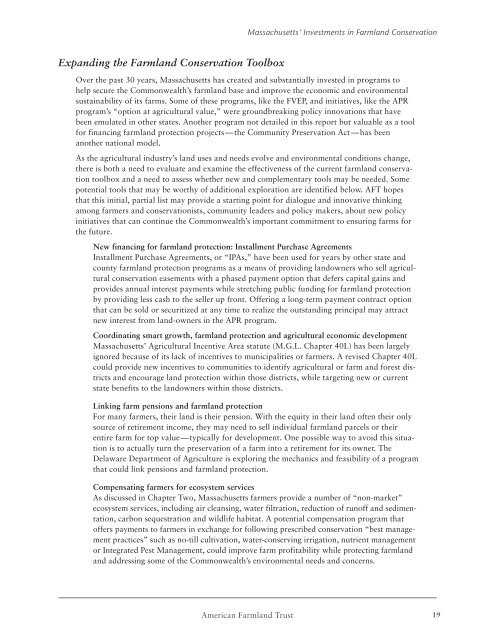
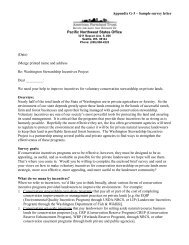

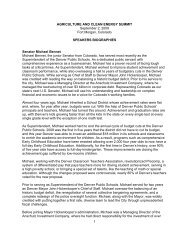
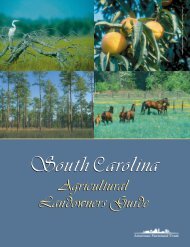
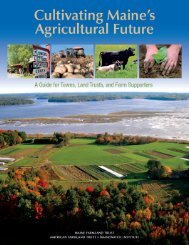
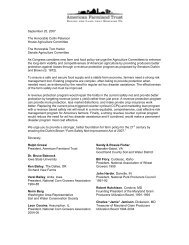
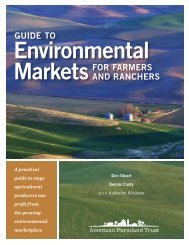
![Farmland by the Numbers [PDF] - American Farmland Trust](https://img.yumpu.com/31549391/1/190x245/farmland-by-the-numbers-pdf-american-farmland-trust.jpg?quality=85)
